|
|
|
Sort Order |
|
|
|
Items / Page
|
|
|
|
|
|
|
| Srl | Item |
| 1 |
ID:
151635
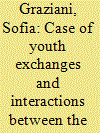

|
|
|
|
|
| Summary/Abstract |
Soon after the founding of the People's Republic of China (PRC), youth exchanges came to be a major part of the Chinese campaign to reach out and influence the people of other nations. Despite the growing scholarly discussion regarding the role of people-to-people diplomacy and external propaganda in China's foreign policy, so far no direct attention has been paid to the Chinese Communist Party's efforts to institutionalize youth exchanges and use them as a tool to promote the new Chinese government's foreign relations. This article locates the position of young people within the PRC's people-to-people diplomacy. It attempts to explore youth exchanges with the West in the early years of the Cold War by focusing on relations between Italian and Chinese youth groups in the 1950s. Relying mainly on unexplored archival material and memoirs, this article documents contacts and exchanges between adult-led youth organizations and their members, and shows how Italian left-wing party-affiliated youth groups and Soviet-dominated transnational organizations provided important channels for Sino-Italian encounters and for building long-lasting contacts among potential future leaders of these countries.
|
|
|
|
|
|
|
|
|
|
|
|
|
|
|
|
| 2 |
ID:
175883
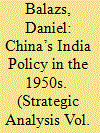

|
|
|
|
|
| Summary/Abstract |
What led to the Sino-Indian militarized confrontations in 1959? I argue that Hindi-Chini Bhai-Bhai became a victim of changed perceptions in China. As long as China’s external and internal environment was relatively secure, India was seen as a potential ally, and Sino-Indian relations thrived. As external and internal pressures on China mounted, India’s behaviour vis-à-vis the Dalai Lama’s flight from China and the territorial dispute was perceived by China as reactionary. This change in perceptions prevented Beijing from adopting a conciliatory approach to India’s claims and eventually led to the 1962 border war.
|
|
|
|
|
|
|
|
|
|
|
|
|
|
|
|
| 3 |
ID:
146789


|
|
|
|
|
| Summary/Abstract |
After the 1948 war, the cease-fire lines between Israel and its neighbours remained porous. Palestinian refugees crossed the borders. Some returned to cultivate their fields; others crossed the border as thieves. Some intended to murder Israelis and wreak terror. Most of the refugees who made their way into Israel were not violent, but their presence frightened Jewish civilians living in frontier regions. Policy-makers and cultural agents of the social elite mobilized to mould the threatened population into Israelis who could display fortitude. The article analyzes the emotional regime the Israeli state sought to inculcate and the desirable and undesirable outcomes of this policy.
|
|
|
|
|
|
|
|
|
|
|
|
|
|
|
|
| 4 |
ID:
162845
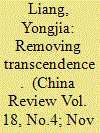

|
|
|
|
|
| Summary/Abstract |
The article analyzes primary sources about regulating Catholic and
Protestant communities in Dali, Southwest China, during the heyday of
the People’s Republic. It was a process of sophisticated containment,
in�ltration, spying, and coercion, with a corresponding restrained use
of violence. �is is surprising given that, �rst, both Catholic and Protestant communities were small and, second, that violence against other
potential threats—counterrevolutionaries and landlords—was severe. I
suggest the goal for the local Department of United Front ( 統戰部
tongzhan bu) was not to eradicate Christianity by force but to divide the
church into those who would submit themselves to the communist
utopia and isolate the hard-core devotees with the expectation that both
would eventually die out without “contaminating” the emerging
socialist subjects. �e regulatory process was one in which the state
power attempted to remove the Christian transcendence with a communist one. �e article challenges the state-society dichotomy underlying
the study of Chinese religiosity, especially the claim of “militant
atheism,” which depicts the People’s Republic of China’s early policy on
Christianity.
|
|
|
|
|
|
|
|
|
|
|
|
|
|
|
|
| 5 |
ID:
172586
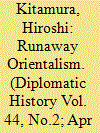

|
|
|
|
|
| Summary/Abstract |
In April 1956, the beautiful but seldom known countryside of Nara prefecture in Japan turned into a site of international attention. On site were a total of thirty-eight cast and crew members from Metro-Goldwyn-Mayer (MGM)—a leading Hollywood studio—scrambling to shoot their upcoming film: The Teahouse of the August Moon (1956, hereafter Teahouse).
|
|
|
|
|
|
|
|
|
|
|
|
|
|
|
|
| 6 |
ID:
190138
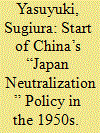

|
|
|
|
|
| Summary/Abstract |
The Chinese Communist Party’s (CCP) Central Committee’s Measure and Plans for Policy Activities concerning Japan, formulated in March 1955, was China’s first Japan Policy Platform after the founding of the People’s Republic of China. It specified policy principles and measures. Its policy directed toward Japan could be called a “Japan neutralization” policy. There were three factors that contributed to the formulation of the Japan Policy Platform. The first factor was the start of full-fledged Japan-China private-sector exchanges and the CCP's aim to break away from a people's diplomacy toward Japan that centered on support for the Japanese Communist Party. The second factor was the major change in postwar Japanese politics with the resignation of the Yoshida Cabinet and the start of the Hatoyama Cabinet. The third factor was the change in foreign policy, with the reintroduction of the “Theory of Intermediate Zones” and the international environment, with the advent of the Sino-Soviet honeymoon period and the intensification of the US-China confrontation.
|
|
|
|
|
|
|
|
|
|
|
|
|
|
|
|
| 7 |
ID:
139680
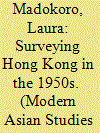

|
|
|
|
|
| Summary/Abstract |
At the end of the Second World War, there were over a million displaced persons and refugees in Europe alone. Hundreds of thousands of people were uprooted with the expansion of the Japanese empire across the Pacific Theater, and many others were similarly displaced when Japan was defeated. Others later fled civil conflicts, in South Asia, for instance, and in China, where thousands left the mainland during the final days of the Chinese Civil War. Among this massive displacement in Asia, unlike in Europe, only a few groups were identified as refugees. One such group consisted of the migrants in Hong Kong who, after 1949, were understood to be refugees fleeing communist oppression in the People's Republic of China. This article examines the critical role that surveys (population studies designed to account for, and define, refugee groups) played in shaping particular, Westernized Cold War understandings of the refugee experience in Hong Kong. These surveys were organized by non-state interests and undertaken with financial support from major American philanthropies. In examining the objectives and methodologies of the refugee surveys conducted in Hong Kong in the early 1950s, in contrast with studies undertaken contemporaneously in Europe, this article observes that, although at the time the flaws in the surveys were recognized and regularly disregarded in the pursuit of broad political objectives, scholars have failed to adequately recognize the subjective nature of the surveys' supposedly empirical evidence. As a result, the dominant European-based narrative about modern refugees has obfuscated the distinctive aspects of the refugee experience in Hong Kong.
|
|
|
|
|
|
|
|
|
|
|
|
|
|
|
|
| 8 |
ID:
154869
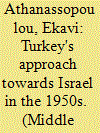

|
|
|
|
|
| Summary/Abstract |
Within the context of Turkey's relationship with Israel, the 1950s are remembered largely as the decade when bilateral relations developed dramatically reflecting the US orientation of Adnan Menderes's foreign policy. On closer observation, however, one cannot fail to notice that there was more ebb than flow in Turkey's policy towards Israel which already assumed the double-faced profile (cold or reproachful in public/positive behind closed doors), which is usually associated with the next two decades. Drawing on substantial research in official US and British archives, this article explores the multiple considerations which informed the approach of the Menderes government towards Tel-Aviv. Crucially, it places the Turks’ approach within their broader Middle Eastern policy with the aim of showing that it was shaped not only by their relationship with their powerful ally, the United States, but also by the need to look after relations with neighbourly Arab regimes.
|
|
|
|
|
|
|
|
|
|
|
|
|
|
|
|
| 9 |
ID:
144090
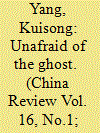

|
|
|
|
|
| Summary/Abstract |
This article examines the origin of the two Taiwan Strait crises in 1954–1955 and 1958. Whereas the previous literature has focused on how domestic and international factors led to the shelling of Jinmen, this study investigates the effects of Mao’s victim mentality. Like many other intellectuals in the late Qing and Republican eras, Mao was deeply disturbed by the Chinese “century of humiliation,” a historical narrative emphasizing foreign intervention and imperialist aggression. Such feelings of humiliation and victimization were reinforced when the American fleet blocked Mao’s plan to reunify China in the 1950s. It is argued that Mao’s victim mentality was a significant factor contributing to his decision to shell Jinmen twice. By analyzing this case, this article reveals the emotional side of the PRC diplomacy.
|
|
|
|
|
|
|
|
|
|
|
|
|
|
|
|
| 10 |
ID:
173669
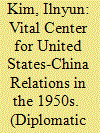

|
|
|
|
|
| Summary/Abstract |
On June 21, 1972, Zhou Enlai, Premier of the People’s Republic of China (PRC), sat with U.S. President Richard Nixon’s national security adviser Henry Kissinger at the Grand Hall of People in Beijing. Zhou began the conversation by broaching a name familiar to Kissinger: “You saw John Fairbank this afternoon?” A born diplomat, Kissinger instantly noticed that this unusual opening remark was not just an icebreaker. Indeed, throughout their four-day meeting, the premier frequently brought out the name of this Harvard professor who visited China at his invitation. At first, Kissinger tried to fend Zhou off.
|
|
|
|
|
|
|
|
|
|
|
|
|
|
|
|
| 11 |
ID:
178794
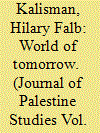

|
|
|
|
|
| Summary/Abstract |
This article contributes to Palestinian intellectual history by discussing the lives and writings of three diaspora intellectuals during the transitional period of the 1950s: Jabra Ibrahim Jabra, Abdul-Latif Tibawi, and Nicola Ziadeh. I argue that they fused a conservative acceptance of state authority and avoidance of radical politics with a liberal understanding of nationalism and scholarship, including freedom, secularism, and objectivity. Without a Palestinian nation-state, their participation in the imagined futures of Pan-Arabism and decolonization meant avoiding radical leftist political movements. Instead, they advanced literature and history, surviving in the diaspora as liberals during Pan-Arabism’s transition from a revolutionary goal to a state ideology.
|
|
|
|
|
|
|
|
|
|
|
|
|
|
|
|
|
|
|
|
|